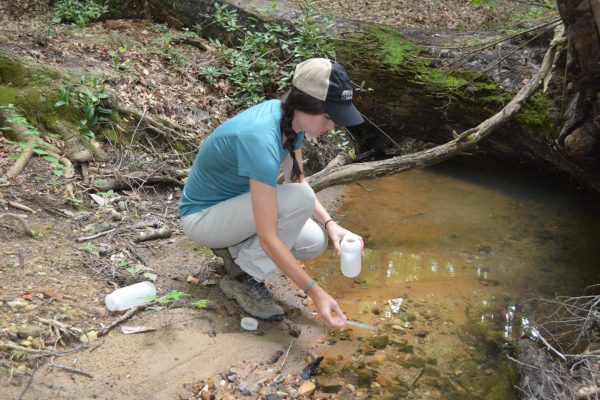For Sara Bolds, Auburn University’s School of Forestry and Wildlife Sciences seemed like the right fit for graduate school from the very beginning.
“Of all the schools I looked at for graduate school, Auburn’s really stood out to me,” said Bolds, a master’s student in wildlife sciences.
One of the primary reasons Bolds chose Auburn was so she could work in a research lab focused on invasive species, so she decided to contact School of Forestry and Wildlife Sciences Professor Stephen Ditchkoff about working in his research lab studying the impacts of wild pigs on forested watersheds.
“I’m looking at a population of wild pigs that’s at a privately owned plantation,” Bolds said. “I am looking at this population because they are very destructive to the land and are not native to the area.”
Bolds said her team is collecting water and soil samples to look at the erosion that the pigs may be causing in the watershed areas.
Even though Bolds isn’t too far along in her research project yet, she is already finding out some of the consequences of having a wild pig population in the area. “We are already seeing signs that water quality decreases when there is a presence of wild pigs,” Bolds said.
Collecting data from the research area is what Bolds most looks forward to. “My favorite part of doing research is going over all the data. We collect it and then we look at it to see what’s going on and try to piece together the puzzle and I think that’s really cool,” she said.
Because Bolds one day wants to work for a federal agency primarily working with invasive species and doing conservation work, she says that the research she is doing with the SFWS has provided her with invaluable experience.
“It’s given me a lot of experience working with invasive species, and I’m really interested in invasive species ecology and conservation biology, and this research will help predict how ecosystems will change long term if these animals have a continued presence,” she said.
What Bolds loves most about Auburn University is that everyone is friendly and eager to help others. “My advisory committee helped me a lot by being supportive and by introducing me to other people in my field and by giving me research opportunities that I would not have been able to have on my own, so I am very fortunate,” she said.
Because working in a research lab has been so beneficial to her, Bolds encourages other graduate and undergraduate students to be a part of one as well. “I was involved in a research lab as an undergrad as well and I believe it really helped prepare me for graduate school so I would definitely recommend it.”
Written by Maggie Smith










